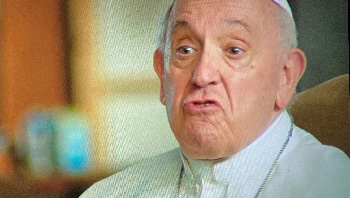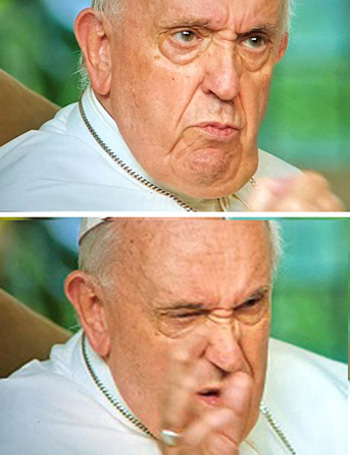Faith under Attack
 |
 |
 |
 |
 |
 |
 |
Movie Review on ‘The Pope Answers’ - Part III
Francis Attacks the Church’s
Structure & Religious Life
The Vatican-promoted movie Pope Francis: Answers (see also here and here) is a casual interview between the Pope and 10 Spanish-speaking youth; it was released on Disney+ and Hulu in Holy Week earlier this year. In these third and fourth articles of the series, I want to provide more translated anti-Catholic excerpts of what Pope Francis affirmed and taught, consistent with the same progressivist agenda that has been forced onto the Church since Vatican II.
I remind readers that this movie was and is being targeted to Spanish-speaking youth, who constitute a huge sector of the world’s Catholic population. According to recent numbers from the Vatican, 48% of the world’s Catholics live in the Americas.
Attacking the ‘structure of the Church’
Many times throughout the interview, Pope Francis made clear attacks against the Church’s structure, insinuating that the source of the corruption we see in her members comes from everything traditional (especially traditional piety and institutions), and affirming the erroneous idea that the Church is always in need of reform.

 One of the young men present was Victor, a Spanish agnostic and DJ, whose family apostatized from the Faith. He asked Francis if he can understand that the Church is becoming irrelevant for many people and, for that reason, many are leaving. The Pope responded:
One of the young men present was Victor, a Spanish agnostic and DJ, whose family apostatized from the Faith. He asked Francis if he can understand that the Church is becoming irrelevant for many people and, for that reason, many are leaving. The Pope responded:
“When there is no testimony, the Church gets rusty. It gets rusty because she becomes transformed into a club of good people who fulfill their religious duties, but they lack the courage to go out to the peripheries. For me that’s clear, eh?
“When you see realities from the center, without realizing it, you start to form protective walls, one, two, three, that go on distancing you from the reality and then you lose the notion of reality. That is, you want to see reality? Go to the peripheries. Do you want to know what social injustice is for example? Walk to the peripheries. And when I say ‘peripheries’ I don’t only mean poverty, I mean cultural or even existential peripheries.”
The false doctrine behind this statement is that Catholics who do not actively go out into the world and engage in communist-style “social justice” and class struggle are not being true Catholics and are not “giving testimony.” Deep down, this progressivist mentality believes in the superiority of the “active” life of “giving testimony” over the “passive” life of traditional piety, implying man does not need God for the apostolate, which is now man-centered.
This idea was attacked by Dom Chautard in his Soul of the Apostolate, which he called the “heresy of works” of Americanism. It was also condemned by Pope Leo XIII in his Encyclical, Testem benevolentiae against Americanism (pp. 19-21).
Later on in the conversation, Francis tells Victor: “Any one of us can change a structure if what we want is just. The great revolutionaries of History changed the structure.”
The presupposition of this statement is that the “great” revolutions of History that “changed the structure” were just. Who are the “great revolutionaries” who did this? The implication is unavoidable: These revolutionaries were Luther and Calvin; Robespierre and Marat; Lenin and Trotsky.
Attacks against piety & religious life
 A consequence of this “active-over-passive” mindset is disdain for traditional piety and religious life, which Francis attacked as being “corrupt” and an “abuse of power” that “dehumanizes.”
A consequence of this “active-over-passive” mindset is disdain for traditional piety and religious life, which Francis attacked as being “corrupt” and an “abuse of power” that “dehumanizes.”
One of the young women present was Lucia, a lesbian former nun. After scenes of her with her lesbian lover are presented to the youth, Lucia explains to Francis that she was a nun, but left the religious life because of “psychological abuse”: She was forbidden to have communication with her family, all her communication was monitored and she was not allowed to leave the house.
What she describes is the normal life of any cloistered pre-Vatican II religious. What she calls “oppressive” was nothing but the normal rule that every nun voluntarily accepted before entering the convent.
Francis’ shocking response to Lucia was to shower praise on her and attack traditional religious life:
“The True Church is on the peripheries. In the center [of the Church] there are good people, there are saintly people, but there is also a lot of corruption. And that has to be recognized. A lot of harm has been done to the ecclesiastical institution... What you say about the abuse of power is true. There are stories that I knew and in which I had to intervene sending inspections.”

 These “inspections” he is referring to are the invasions and closures of traditional monasteries and convents who were not “going out to the peripheries” enough. This overhaul of religious life is not something that has occurred only during Francis’ pontificate; it was the same policy that was implemented by all the Conciliar Popes to varying degrees but all with the same goal: to destroy traditional religious life. The emptied convents and dearth of vocations are one of the disastrous fruits of Vatican II. See more examples of this here, here, here, here, and here.
These “inspections” he is referring to are the invasions and closures of traditional monasteries and convents who were not “going out to the peripheries” enough. This overhaul of religious life is not something that has occurred only during Francis’ pontificate; it was the same policy that was implemented by all the Conciliar Popes to varying degrees but all with the same goal: to destroy traditional religious life. The emptied convents and dearth of vocations are one of the disastrous fruits of Vatican II. See more examples of this here, here, here, here, and here.
He continues, praising Lucia for her decision to “run away” from the convent:
“[These inspections occurred in] convents [monasteries] where there was an abuse of power. Nuns who couldn’t call their families on the phone, that is, just as you said, total isolation, a total abuse of power, and when you have a story like the one you told, I believe you, because unfortunately that happens in the Church. The most courageous act [in that moment] is to run away.
"That is to say, take some distance and [say] ’To your tents, Israel!’ [It is to say] This is a bad place, this is a place of corruption, this convent dehumanizes me. I’m going back to where I started from, to look for my humanity in my roots. I’m not scandalized by that. But things have to be called by their first and last names. But I don’t want to convince you, not at all, I respect you. But in you, I see the pain of so many people who have had to suffer these ecclesiastical abuses.”
Lucia defiantly responds: “I also don’t think [my situation was] with pain. I think it’s the best thing that’s happened to me.”
Pope Francis’ answer:
 “Of course it is, you saved your life from a situation in which you were a prisoner psychologically and morally. You saved your life, but your life hasn’t ended. You keep walking, and even though you don’t realize it, someone is accompanying you, let them accompany you even if you don’t pay attention to them. … You’re in good hands, keep going on your path, I tell you this sympathetically”.
“Of course it is, you saved your life from a situation in which you were a prisoner psychologically and morally. You saved your life, but your life hasn’t ended. You keep walking, and even though you don’t realize it, someone is accompanying you, let them accompany you even if you don’t pay attention to them. … You’re in good hands, keep going on your path, I tell you this sympathetically”.
Instead of correcting Lucia and chastising her for her errors, the Pope praises her, affirms cloistered life is a “prison,” and assures Lucia she is on the right path, that she needs to choose her own ideas, and that “someone” is accompanying her, implying God, yet while he said it, he flashed a mischievous smile...
In the next article, I will examine Pope Francis’ attack on “colonizations,” his favoring inorganic immigrations, and his apparent praise of Tinder and homosexual relationships.
Continued

I remind readers that this movie was and is being targeted to Spanish-speaking youth, who constitute a huge sector of the world’s Catholic population. According to recent numbers from the Vatican, 48% of the world’s Catholics live in the Americas.
Attacking the ‘structure of the Church’
Many times throughout the interview, Pope Francis made clear attacks against the Church’s structure, insinuating that the source of the corruption we see in her members comes from everything traditional (especially traditional piety and institutions), and affirming the erroneous idea that the Church is always in need of reform.

Francis to Victor: ‘The Church is rusty because she does not go to the peripheries’

“When there is no testimony, the Church gets rusty. It gets rusty because she becomes transformed into a club of good people who fulfill their religious duties, but they lack the courage to go out to the peripheries. For me that’s clear, eh?
“When you see realities from the center, without realizing it, you start to form protective walls, one, two, three, that go on distancing you from the reality and then you lose the notion of reality. That is, you want to see reality? Go to the peripheries. Do you want to know what social injustice is for example? Walk to the peripheries. And when I say ‘peripheries’ I don’t only mean poverty, I mean cultural or even existential peripheries.”
The false doctrine behind this statement is that Catholics who do not actively go out into the world and engage in communist-style “social justice” and class struggle are not being true Catholics and are not “giving testimony.” Deep down, this progressivist mentality believes in the superiority of the “active” life of “giving testimony” over the “passive” life of traditional piety, implying man does not need God for the apostolate, which is now man-centered.
This idea was attacked by Dom Chautard in his Soul of the Apostolate, which he called the “heresy of works” of Americanism. It was also condemned by Pope Leo XIII in his Encyclical, Testem benevolentiae against Americanism (pp. 19-21).
Later on in the conversation, Francis tells Victor: “Any one of us can change a structure if what we want is just. The great revolutionaries of History changed the structure.”
The presupposition of this statement is that the “great” revolutions of History that “changed the structure” were just. Who are the “great revolutionaries” who did this? The implication is unavoidable: These revolutionaries were Luther and Calvin; Robespierre and Marat; Lenin and Trotsky.
Attacks against piety & religious life

Lucia: a revolted & lesbian former nun from Peru
One of the young women present was Lucia, a lesbian former nun. After scenes of her with her lesbian lover are presented to the youth, Lucia explains to Francis that she was a nun, but left the religious life because of “psychological abuse”: She was forbidden to have communication with her family, all her communication was monitored and she was not allowed to leave the house.
What she describes is the normal life of any cloistered pre-Vatican II religious. What she calls “oppressive” was nothing but the normal rule that every nun voluntarily accepted before entering the convent.
Francis’ shocking response to Lucia was to shower praise on her and attack traditional religious life:
“The True Church is on the peripheries. In the center [of the Church] there are good people, there are saintly people, but there is also a lot of corruption. And that has to be recognized. A lot of harm has been done to the ecclesiastical institution... What you say about the abuse of power is true. There are stories that I knew and in which I had to intervene sending inspections.”

Francis accuses ex-nun Luica's religious Order as abusive, then praises her for leaving

He continues, praising Lucia for her decision to “run away” from the convent:
“[These inspections occurred in] convents [monasteries] where there was an abuse of power. Nuns who couldn’t call their families on the phone, that is, just as you said, total isolation, a total abuse of power, and when you have a story like the one you told, I believe you, because unfortunately that happens in the Church. The most courageous act [in that moment] is to run away.
"That is to say, take some distance and [say] ’To your tents, Israel!’ [It is to say] This is a bad place, this is a place of corruption, this convent dehumanizes me. I’m going back to where I started from, to look for my humanity in my roots. I’m not scandalized by that. But things have to be called by their first and last names. But I don’t want to convince you, not at all, I respect you. But in you, I see the pain of so many people who have had to suffer these ecclesiastical abuses.”
Lucia defiantly responds: “I also don’t think [my situation was] with pain. I think it’s the best thing that’s happened to me.”
Pope Francis’ answer:

Francis’ face changes when he tells Lucia: ’Someone is accompanying you...’
Instead of correcting Lucia and chastising her for her errors, the Pope praises her, affirms cloistered life is a “prison,” and assures Lucia she is on the right path, that she needs to choose her own ideas, and that “someone” is accompanying her, implying God, yet while he said it, he flashed a mischievous smile...
In the next article, I will examine Pope Francis’ attack on “colonizations,” his favoring inorganic immigrations, and his apparent praise of Tinder and homosexual relationships.
Continued

Posted November 6, 2023
______________________
______________________





